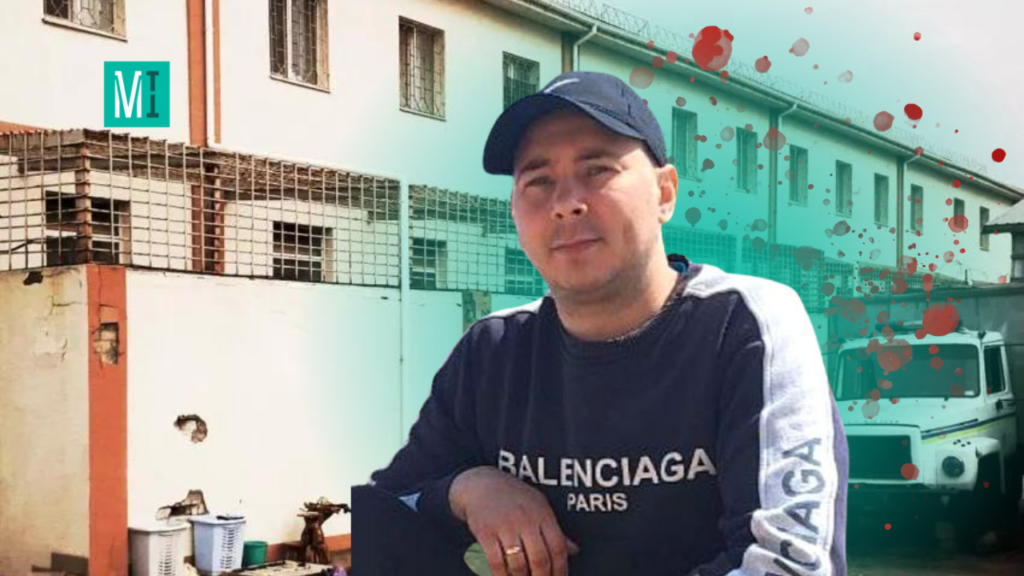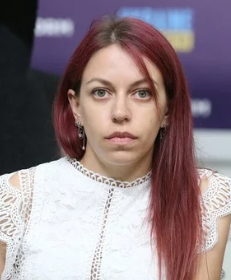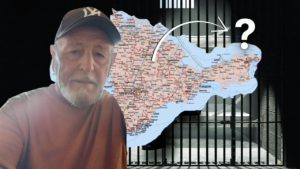“Spotter from Chornobaivka”: how Maksym Bilychuk survived kidnapping, seven months of captivity, torture, and at last appeared in the territory controlled by Ukraine

Maksym Bilychuk is a thirty-year-old resident of Chornobaivka, the strategically important village near Kherson, where the airfield is located. He had neither military nor volunteer experience before a full-scale invasion. He spent the first month and a half of the Great War in the basement with his nephew, wife and neighbors.
In total, there were 18 people in the basement. Maksym’s father, the former military service man, told him what to do and how to do it. In the local store, together with his wife, Maksym sold bread, brought cabbage, and gave it away for free. The man recalls beginning of the occupation
“The Russian military service men brought us their “humanitarian help”. I remember there was buckwheat and butter, but we burned it right in front of them. They watched it and were silent. We told them to leave.”
In May 24, 2022, the neighbor called to Maksym Bilychuk and warned him to run away because the occupiers were looking for him. The Russians knew on which street the couple lived and asked their neighbors. After neighbor’s call wife called to him and said that that the Russians were already at their house, and the street was blocked. Due to the fact that Maksym’s father, who is suffering from oncology, refused to give his son’s contact information, the occupiers beat him. At the end, they grabbed the phone and called Maksym. He picked up the phone and heard: “Boy, go home, this is the Russian Federation. We need to talk with you.”
Maksym called taxi, left the work car with his partner and went home. The street on which family lived was blocked by “Ural”. There was a machine gunner on the truck. Maksym said that they were waiting for him, after that he saw 12 people in masks and with automatic weapons. The soldiers were dressed in uniforms with inscription the National Guard of Russia. One of them, named Vitalii, was present during many subsequent interrogations, beating and treating Bilychuk cruelly.

Russian military vehicle “Ural”. Photo: from open sources
Maxim was put in “Ural”. Mask was put on his face, and a green bag was placed on top. One of the National Guardsmen of Russia told the man that they had been looking for him for a long time.
“I was asked only one question: “Dumped?” – recalls Bilychuk. – Well, of course, out of fear, I said: “No.” This was my first mistake. The fact that I deleted all this from the phone did not make any sense, they could have lifted the correspondence from the device for the last six months. Although I deleted absolutely all contacts and photos, they found everything.”
Maksym says that only few people knew what he was doing. He claims that he deliberately informed Ukrainian side about the movement of equipment and positions of the occupiers, but he did not fully understand what the Russians, who abducted him and held him captive, were capable of.
Sledgehammer, executioner “Kalina” and gun in his mouth
The man found out where he was being held a week after the abduction. It turned out that in the Kherson Detention Center on the Teploenergetik Street, 3. There he was thrown into the cell, where there were four other locals. They were forbidden to talk to him.
During the very first day of his stay in the Detention Centre, they took Bilychuk to the corridor, put a bag over his head and started beating him with a rubber sledgehammer on his legs and back, shouting: “What are you, you beast, you’re in trouble, we’ve found you!” After beating, Maxim was thrown into the cell, other prisoners were warned that he should not sleep on the bed, smoke or eat today. For failure to comply with the order, the prisoners were threatened with massacre. During the next 11 days, the man was hardly allowed to eat. They threw only a piece of moldy bread or two galette cookies a day.
In the cell were water, toilet, five bunk beds and a table. Maksym Bilychuk says that the next day they brought another man who was captured by the occupiers because of tattoo – German cross on his arm. Now there were six of them in the cell.
In the morning after the night Maksym was again put a cap over his eyes and led upstairs. Maksym heard shouts: “We found him, here he is, Spotter of Chornobaivka!” During the interrogation, the man did not admit that he had provided the Ukrainian military service men with information about positions of the occupiers and the movement of equipment. After that, they tied him to a chair and began to shock him with electric current. They were also beaten with hands and feet, doused with water and again with electric shocks. That time it was not possible to get confession out of him. He replied that he did not cooperate with anyone and did nothing.

The Kherson Temporary Detention Center on the Teploenergetik Street, 3. Photo: Human Rights Watch
Bilychuk remembered two executioners – Vitalii, whom he saw during the abduction, and the Russian named “Kalina”:
“They beat in the morning and during night. During one interrogation, there were five to six electric current approaches for 15 seconds. They connected the electric current to my fingers, ears and genitals. Water was poured over for better current conduction. The bottle from the water was usually then thrown directly into the face.”
It should be noted that other victims who were also in the Kherson Temporary Detention Centre on the Teploenergetik Street, 3, in conversations with the MIHL, describe similar methods of torture: electric shocks through the fingers, ears, genitals and dousing the body with water for the better current conduction.
Maksym Bilychuk’s severe interrogation lasted for five days. The Russians also took his fingerprints and DNA samples. They forced him to write a confession every time. The man wrote nonsense to pass the time, hoping that his family would be able to leave: “They gave me a piece of paper and a pencil and said: “Write a confession, then it will be better. We will work with you”.
The next day, he was again taken for questioning and the “confession” he had written before was read out. “They read it and said: “Did you go to school? Did you write compositions?” – recalls Bilychuk. – I replied that I wrote, but not well. They told me: “Well, here you wrote poorly. Do you think we are idiots here?! You idiot, we are cops. We need you right now. We throw you out and the end”.
One of them came out, the other put a gun in my mouth and said: “I’m going to shoot you now, beast.” Said to me: “These are your coordinates. You, beast, fell on our boys.” Then he stuffed paper into my mouth and said: “Chow.” They continued to beat me with hands, feet, and electric current.”
In the end, the man promised to write a confession, but did not admit his guilt. He was taken to the cell: “At night we heard loud screams, someone was being killed. They really killed people there. When I was transferred to another cell, Tolia was killed in the one next to it. I did not see his face. Tolia was the artilleryman. He walked from Kherson to Mykolaiv. Unfortunately, I do not know his last name. He was beaten for only two days. On the second day, he couldn’t stand it anymore. I myself lay almost at the point of death. And that was just the beginning.”
During the interrogations, Bilychuk was also drowned: “T-shirt was thrown over the cap that was on his face, and water was poured into his mouth. The head was kept thrown back until you start feeding and suffocating.”
Death sentence and VIP-cell
Once at midnight, the Russian executioner nicknamed “Kalina” came to Bilychuk’s cell to take him back for questioning. Before that, in Temporary Detention Center the music was turned on at full volume to drown out the screams of victims. The song “I am Russian” by the Russian singer Shaman was playing. That time, Maksym was not only beaten, but melted plastic was dripped on his body. This continued until dawn.
“After a while, they opened the door, threw me a pen, five sheets of paper and said: “Write everything you know. About your family, about your mother-in-law, about everyone you talked to. If the investigator doesn’t like it tomorrow, your existence will be finished.” Bilychuk confessed, but did not betray anyone. The interrogations stopped there, but the beatings did not. He says that in a few days he was taken away again. He showed them his confessions. The occupiers added something of their own, and then allowed me to record an audio message and send it to my mother.
“I wrote down that I am alive, that everything is fine with me. They told me to speak like that. He also said that they were being fed and that I had done everything I was accused of and had confessed in this. Then I was returned to the tenth cell. One night, they came into our cell again with a piece of paper on which there were names and opposite each surname – what was detained for. Opposite mine was written “spotter”. Then it all started again. It was about the 20th day of my stay there.”

Maksym Bilychuk before capture. Photo: Family archive of the Bilychuk Family
The man recalls that the occupiers forced the prisoners to shout “Glory to Russia, Glory to Putin, Glory to Shoigu!” Those who did not scream were beaten with electric shocks. His relatives did not know where he was being held for 30 days. Due to severe stress, his brother lost his speech for several days, and his wife almost died – she broke a bone when she was carrying heavy bags and handing them to her husband.
One day the Russian soldiers entered Bilychuk’s cell and told him that he was facing death sentence, after which they transferred him to another cell: “It’s your last night. Wrote a farewell letter to your relatives.” I wrote that I love everyone, said goodbye. They took this letter and tore it up in front of me, said that they would not hand it over. They did not physically touch me after that. On the 50th day, they transferred me to another cell, No. 9. This is the so-called VIP cell. The boys said that they would hold and let go. I knew it wasn’t so.”
This cell had better conditions – there was a carpet on the floor, there were mattresses and pillows, five beds, a broken tape recorder. He says that the cellmates were former prisoners, they agreed to provide them with elementary conditions. Later, Maksym was appointed as a cook, he prepared food for 164 people. When I was carrying it around the cells, I saw how the Russians abused the prisoners.
“They forced us to learn the Russian national anthem,” says Maksym Bilychuk. – It happened that they would point to anyone and say: “Sing.” If you just recite the words, they make you sing. If you didn’t sing something correctly, you go to the door, turn your back to the executioners and they shock you. I saw this every day when I delivered food to the cells.”
Sometimes the prisoners were taken to the shower, but not for walks. Only women were allowed to walk, who were also kept behind bars and beaten. Maksym recalls that the occupiers forced the prisoners to eat the Ukrainian flag, defecate on paper and eat it. Minors were also detained, but, according to Bilychuk, they were quickly released. Prisoners were also forced to vote in a fake “referendum”.
Release
In October 18, 2022, Maksym Bilychuk saw a bus with tinted windows from the cell window. The occupiers began to look into the cells, to name who must get ready. “My last name was called, I asked: “Home?” They told me: “We don’t know, get ready.” I realized that I was going further, – the man recalls. – I got ready, they tied my hands with a cable tie, put me in the back seat of the car. We stopped on the other side (Dnipro, MIHL) near the “Nairi” cafe.
We were dropped off, offered to smoke, we smoked three cigarettes at once, with our hands tied and our caps down. I heard bullet whiz past my ear. They fired once, as if they were having so much fun. We finished smoking and left. We were thrown into the trunk again.”
The car stopped in Chaplynka in front of the gates of the District Police Department. Men were pulled out of the car. The Russians who brought them left. The ties were removed from the hands of Maksym Bilychuk and another prisoner named Arthur. They took all their belongings, took them down to the basement, and took off their masks. There were terrible conditions inside – no water, no toilet, no normal places to sleep, men were not allowed to eat.
After some time, Bilychuk was recognized by the occupier nicknamed “Evil”, who looked into the basement. He went to his family and said that Maxim could be released into the street, since he helped them – washed cars, dug pits for toilets, etc. Upstairs, the prisoner was met by another Russian – with the call sign “Medved”. He asked why he was sitting here. Bilychuk said that he sent the second photo of the explosion in Chornobaivka. Later, the prisoner was brought into the office and forced to write that he had no complaints against the occupiers. After that they released him. The guard called the prisoner’s wife, she arrived. The family lived in Chaplynka for several days. Then they settled in the village of Baltazarivka, 17 km from Chaplynka, and lived there for half a year.

Chaplynka Entry-Exit Control Check-Point on the administrative border with Crimea. Stopped functioning in October 19, 2021. Photo: visti.ks.ua
“Russians often went by transport on the streets, checking passports. I was very worried about not getting back to where I was. They asked why we were here. We had to say that we were displaced people, evacuating to Baltazarivka. We were told to make Russian passports, – says Bilychuk.
– They moved out through the Crimea. They found the carrier with his own car, paid him 60,000 rubles. In Armiansk, they kept me for four hours, stripped me, checked me, because I was found in the database. At the Control Check-Point, they kicked out my wife, took my fingerprints, shouted that I was the spotter of Chornobaivka.
They stripped me to my pants, started calling someone. They asked who released me. I called the call sign “Medved”. They smiled. And then they said to the mother: “Get out of here, so that such human beings will not be on out beautiful territory what a lot of human things were on our beautiful territory.”
They were checked again on the Kerch Bridge, after which the driver took the couple and their friend with her family to Krasnaia Yaruga. There they spent the night in a hotel where there were many Ukrainians who were also going home. In the morning, they called a taxi, drove towards Kolotylivka to the Control Check-Point between Sumy and Belgorod Regions. There, they checked their documents, gave them their passports and allowed them to enter Ukraine. Here, the man underwent the forensic medical examination, burns from melted plastic left on his body. Currently, the man is recognized as the victim.
It should be noted that due to the effective work of the Armed Forces of Ukraine at the airport in Chornobaivka, the Russians seized civilians in the village almost every day. They were accused of adjusting the fire. Currently, the MIHL is aware of ten cases of violent abductions in Chornobaivka. Some of the hostages were released by the occupiers before retreating from the right bank of the Dnipro or after they moved to the left bank. The fate of the three abductees remains unknown.







